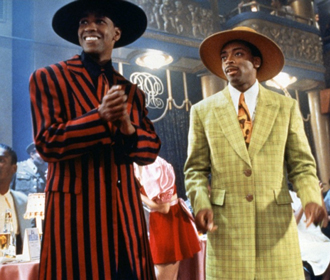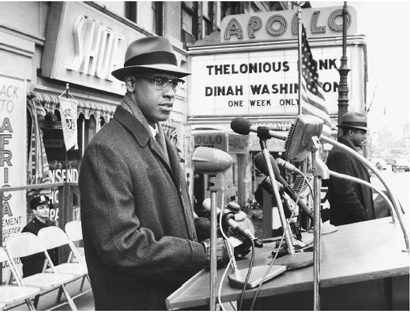
 |
|
|
|
Spike Lee's epic-length biography of the controversial Black Muslim leader Malcolm X is his most assured work, a great film made from difficult material. Lee celebrates Malcolm without enshrining him and lets the controversial nature of much of the man's teachings speak for itself. Like many important leaders Malcolm was a born agitator bearing challenging ideas, a number of them highly debatable. Lee's biopic allows its subject to be believably imperfect. This choice distinguishes Malcolm X from well-intentioned yet overly mythologizing bios such as Richard Attenborough's Gandhi. The object is to hopefully understand Malcom X, not encourage worship of him. 
The important historical figure did not come from auspicious beginnings. Aimless young Malcolm Little (Denzel Washington) becomes a numbers runner in Harlem for West Indian racketeer Archie (Delroy Lindo) but after a falling-out must flee to Boston with his friend Shorty (Spike Lee) and his white girlfriend Sophia (Kate Vernon). A string of burglaries earns Little some serious jail time, where he converts to the Black Muslim church The Nation of Islam by fellow convict Baines (Albert Hall). Malcolm becomes a firebrand preacher for the head of the faith, Elijah Muhammad (Al Freeman Jr.) and dedicates his life to the cause of black emancipation. Immensely popular, he expands the Nation of Islam greatly while attracting jealousy and deceit within the organization. He marries a good Muslim nurse/dietician named Betty Shabazz (Angela Bassett) and raises a family. But Elijah Muhammed turns against the charismatic Malcolm, just as his rhetoric is attracting the scrutiny of the FBI. Denzel Washington pulls off quite a coup with Malcolm X by making the man sympathetic without diluting his message. Malcolm's fiery opinions began with the idea that white men were the Devil and only slowly worked their way toward a more tolerant point of view. Spike Lee and Arnold Perl's script keeps Malcolm's provocative edge intact. At times he calls for complete segregation of the races. He also condemns the commitment to non-violence of other black leaders, branding such pacifist views as Uncle Tomism. With 202 minutes of screen time at his disposal Lee has plenty of time to detail Malcolm Little's early life. His youth becomes an indictment of all the things Malcolm felt a black man could do to discredit himself. Straightening one's hair is seen as an effort not to be black, and polluting oneself with alcohol, cigarettes and drugs (in Muslim terms) is perverse way of actualizing the white man's low opinion of the black race. Malcolm's personal revolution and the philosophy he would later preach have little in common with tolerance or the Christian concept of turning the other cheek. His prison mentor Baines shows him how society is fixed against the black man with a simple comparison of how white and black are defined in the dictionary. 
The retro-progressive Muslim religion that Malcolm advocates maintains traditionally restrictive male and female roles that beg comparison with fundamentalist Christian and Jewish sects. When Malcolm feels it's time to make a proper Muslim marriage, his proper wife is supposed to be a certain height and a certain age (half the man's age plus seven). The film opens with a provocative image of an American flag burning away to reveal a graphic "X" standing defiantly alone. With that gauntlet thrown at the feet of the establishment, Lee sets aside most of the visual fireworks and attention-getting devices of Do the Right Thing in favor of straight storytelling. The production is put together with masterful ease, effortlessly creating convincing period settings for Harlem dances, Boston slums and the streets of New York City. The dance scenes are entertainingly over-idealized, but when Malcolm leads his churchmen to demand proper medical treatment for a black man beaten by the police, Lee's directorial control is admirable. In other hands the scene might merely grandstand for an easy emotional reaction. Spike Lee was also able to rally a knockout cast, without investing time in special pleading or appearances by favored stars. Denzel Washington is a bona fide star light-years beyond the Sidney Poitier days, the intelligent and (when needed) tough-minded authority figure that Harry Belafonte was prevented from being forty years earlier. The portrait of the loving and sincere Angela Bassett shows that Lee is as good at presenting upstanding, square blacks as he is hipsters. Al Freeman Jr. (Castle Keep) is cryptically menacing as Malcolm's mentor and eventual betrayer. Delroy Lindo is impressive as a three-dimensional numbers racketeer and Kate Vernon interesting as the white girl who helps lure him into crime. Spike Lee gives himself roles in many of his films and here plays a rather scurvy associate of Malcolm in his hoodlum days. He'd previously been Denzel's sidekick in Mo' Better Blues. If Lee were reserving himself special status or wasn't a good actor this could be disastrous, but he has a better record of acting in his own films than any director I know. The star cameos are in no way disruptive. Christopher Plummer, Peter Boyle and Karen Allen have sharp little vignettes. Many real personages are worked into the distinctively moving montage that Spike uses to end his story and to provide a coda at the tail end of the credits: Tracy Chapman, Bill Cosby, Angela Davis, Janet Jackson, Jesse Jackson, Magic Johnson and Michael Jordan. Nelson Mandela makes a breathless speech that evokes the "I am Spartacus" cry of rebellion, and the late, great Ossie Davis recreates his original eulogy for Malcolm X. 
The "guests" that appear at the end of the credits are some of the supporters who donated to the film or helped Lee fund it. The Malcolm X project reportedly began at Columbia way back in 1967, and leftist writer Arnold Perl had completed a script not long after that. Spike Lee reportedly had to wrest control of the movie from Norman Jewison to make it his own; his script contribution is said to mainly cover the scenes he's in plus the Mecca sequence. Earlier production efforts were stymied by studio demands that its political content be minimized (?). There was also bizarre talk of Charlton Heston playing Malcolm X in makeup. (??!) 1 Warner Home Video's Blu-ray of Malcolm X was announced and then delayed, I believe, about two years ago. This Blu-ray comes in Warners' "little book" package with a 40-page color souvenir book inside. The expensive book (printed on slick quality paper) contains a Blu-ray and a standard DVD, which contains an entire 90 minute Oscar-nominated docu from 1972, also titled Malcolm X. Watching it gives one an appreciation for Lee's visual and tonal accuracy. The Blu-ray holds the entire 3-hour, 12-minute film plus By Any Means Necessary, an interview making-of docu. There are also twenty minutes of deleted scenes with an introduction from Lee, and a trailer. Lee and his technical collaborators contribute a full commentary, a track that is a good excuse to run the show again.
On a scale of Excellent, Good, Fair, and Poor,
Malcolm X Blu-ray rates:
Footnote:
1. This information is from Paul Buhle & Dave Wagner's book Hide in Plain Sight: The Hollywood Blacklistees in Film and Television, 1950-2002
Reviews on the Savant main site have additional credits information and are often updated and annotated with reader input and graphics. Also, don't forget the 2011 Savant Wish List. T'was Ever Thus.
Review Staff | About DVD Talk | Newsletter Subscribe | Join DVD Talk Forum |
| ||||||||||||||||||